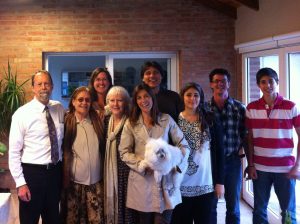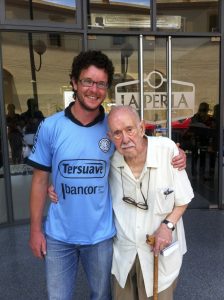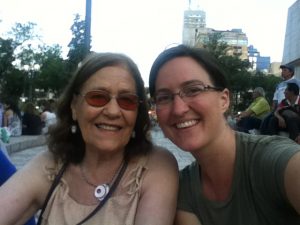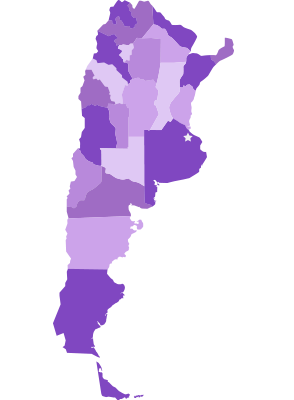Argentina Report
Hello again from Córdoba, Argentina, the little part of Europe that ended up in South America! Hello from the land of tango, the land of gauchos, the land from which the current Pope hails, and the land that will take your breath away with its scope, diversity, and beauty. Hello from a land so different from my own, so diverse, with many stories to be told.
 I had a friend ask me, “What is it like? What is it like to leave your culture, your ecclesia, and move to a place so different? How did you adapt?” To which my short response is: I haven’t yet. Not completely anyway. The first month was a wondrous dream: each event had a new facet to it, everything was so new and intriguing. I was extremely blessed to come here at a time when there was a missionary here from a English-speaking country, who explained to me how things are different, what social customs exist, and helped me when I had questions that would seem obvious to a native. A little example: here they have a tea drink called yerba mate, or mate for short (pronounced ma-tay), which is drunk with a silver plated straw from a gourd filled with tea leaves. All parties share the same straw, and it is passed from the person serving to each person in succession. If one doesn’t want any more, he or she simply says ‘thank you’ upon returning it. This drink is everywhere, and I may even call it the national drink of Argentina. Walking, one will see the familiar shape of the mate gourd and thermos in many a person’s hand. If needed, someone might explain this to the foreigner, but there is a connection that’s formed when it is found that they don’t need to, the ‘foreigner’ already know. Personally, I very much like mate and find the custom delightful.
I had a friend ask me, “What is it like? What is it like to leave your culture, your ecclesia, and move to a place so different? How did you adapt?” To which my short response is: I haven’t yet. Not completely anyway. The first month was a wondrous dream: each event had a new facet to it, everything was so new and intriguing. I was extremely blessed to come here at a time when there was a missionary here from a English-speaking country, who explained to me how things are different, what social customs exist, and helped me when I had questions that would seem obvious to a native. A little example: here they have a tea drink called yerba mate, or mate for short (pronounced ma-tay), which is drunk with a silver plated straw from a gourd filled with tea leaves. All parties share the same straw, and it is passed from the person serving to each person in succession. If one doesn’t want any more, he or she simply says ‘thank you’ upon returning it. This drink is everywhere, and I may even call it the national drink of Argentina. Walking, one will see the familiar shape of the mate gourd and thermos in many a person’s hand. If needed, someone might explain this to the foreigner, but there is a connection that’s formed when it is found that they don’t need to, the ‘foreigner’ already know. Personally, I very much like mate and find the custom delightful.
 A little bit more difficult to become used to is the perception of time here. I read an article once about Americans and how we view time. It stated: 5-10 minutes early is ‘on time’, and 5 minutes after is ‘late’. If you are going to be more than 10 minutes late, it is polite to call and inform the host. Not so in Argentina. Time is a shifting and moving creature, and pinning it down to your expectations is well-nigh to impossible. Being here requires that one set aside preconceptions and judgments around time. Because often, the person is ‘late’ according to North American standards because he or she was interacting, relating to, or helping someone else. Here, the relationship is very important, more important many times than business.
A little bit more difficult to become used to is the perception of time here. I read an article once about Americans and how we view time. It stated: 5-10 minutes early is ‘on time’, and 5 minutes after is ‘late’. If you are going to be more than 10 minutes late, it is polite to call and inform the host. Not so in Argentina. Time is a shifting and moving creature, and pinning it down to your expectations is well-nigh to impossible. Being here requires that one set aside preconceptions and judgments around time. Because often, the person is ‘late’ according to North American standards because he or she was interacting, relating to, or helping someone else. Here, the relationship is very important, more important many times than business.
I can’t say as of yet that I have clear insight on the people, the culture, or even everything about how to get around, but I’m enjoying discovering more little by little. There is a reason for every difference, for every action, and I’m loving listening to find out not just the ‘what’, but the ‘why’.
 There is a structure in the Spanish language which uses the verb ‘tener’ followed by ‘que’ and a verb, and it’s used to express obligations, duties, and basically whatever things need to get done. Therefore ‘tienes que hablar’ is translated as ‘you have to speak’. In terms of adjusting, by far the biggest obstacle has been the language. When I talk in English, I don’t even realize the variety of sentence structure and vocabulary that changes with each subject that I use. Listening, my mind picks up naturally the shades of meaning and missing sounds of others, and my mind grasps the concepts, ideas, and levels of meaning of the communicator. What an amazing thing is the mind. Not so in Spanish. Here, when learning Spanish, it is necessary to listen, listen carefully, ask questions when you don’t know something, and always, always….tienes que hablar. Only by practicing, learning from mistakes, and taking the brave step forward to just speak will you really improve when learning a new language. You will worry about looking foolish, and saying the wrong thing, but you must not let that rule over you. How much is that like our speaking in the Truth? For realistically, our language, concepts and thoughts in the Truth are a new language to the natural man. We need to listen, study, and especially need to speak of the things that we have seen and heard. There is a day coming, and we are the watchmen. Have we sounded the alarm? Will I? Will you?
There is a structure in the Spanish language which uses the verb ‘tener’ followed by ‘que’ and a verb, and it’s used to express obligations, duties, and basically whatever things need to get done. Therefore ‘tienes que hablar’ is translated as ‘you have to speak’. In terms of adjusting, by far the biggest obstacle has been the language. When I talk in English, I don’t even realize the variety of sentence structure and vocabulary that changes with each subject that I use. Listening, my mind picks up naturally the shades of meaning and missing sounds of others, and my mind grasps the concepts, ideas, and levels of meaning of the communicator. What an amazing thing is the mind. Not so in Spanish. Here, when learning Spanish, it is necessary to listen, listen carefully, ask questions when you don’t know something, and always, always….tienes que hablar. Only by practicing, learning from mistakes, and taking the brave step forward to just speak will you really improve when learning a new language. You will worry about looking foolish, and saying the wrong thing, but you must not let that rule over you. How much is that like our speaking in the Truth? For realistically, our language, concepts and thoughts in the Truth are a new language to the natural man. We need to listen, study, and especially need to speak of the things that we have seen and heard. There is a day coming, and we are the watchmen. Have we sounded the alarm? Will I? Will you?
“But we have this treasure in earthen vessels, to show that the transcendent power belongs to God and not to us.” 2 Corinthians 4:7
Written by Sis. Colleen Uiga, Spanish Truth Corps.
